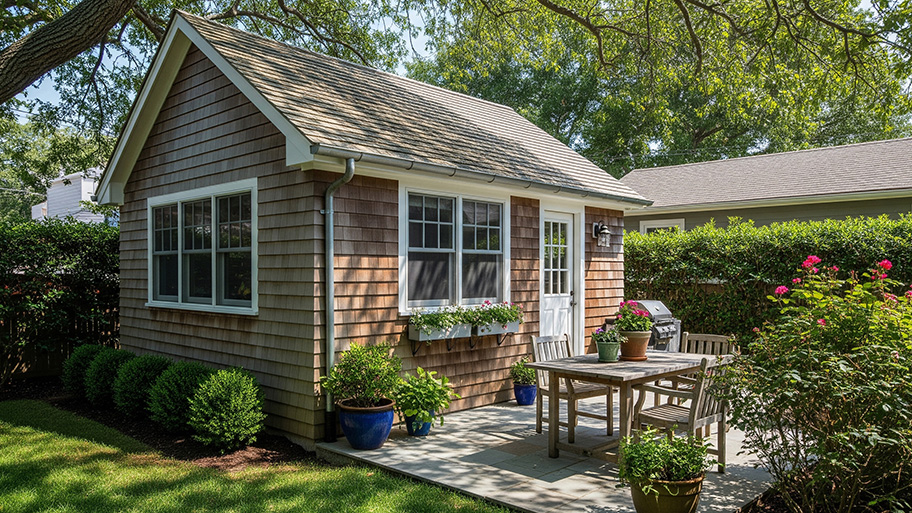
Your faucet plays a major role in your kitchen's overall design and functionality. Learn how much it costs to install a kitchen faucet based on brand, type, and city.
Better to ask for permission than forgiveness when adding onto your home


All permanent improvements to your land, including home additions, will require permits.
You may get fined or have to demolish your home addition if you fail to pull permits.
Permit requirements vary by location, so check with your contractor or local building department for specifics.
Permits for home additions cost between $500 and $2,000 and can climb higher in some areas.
Building a home addition will add square footage and value to your property, but before you break ground, you’ll need to get permission for your project. It’s crucial to understand what permits are needed to build a home addition before you get started to avoid surprise permit fees, violations, and illegal construction. Let’s discuss what permits you’ll need and how to get them.
No, you can’t legally add a room to your house without a permit. All building departments will require at least a general construction permit for a home addition, and most will require additional permits for things like plumbing, electrical, and HVAC work. Building without permission from your municipality could land you with violations and expensive fines, and you may even be forced to knock down the addition and return your property to its original condition if your building department finds out about the illegal construction.
Building a home addition is a complicated home improvement project, so depending on your plans for the construction, you'll need several different types of permits before you begin.
In almost all municipalities, you’ll at least need a general construction permit to build a home addition. This type of permit often comes with a fee equal to a certain percentage of your home addition cost. It usually covers the following work:
Foundation pouring
House framing
Window and door installation
Roofing
Interior and exterior finishes
You’ll need a general construction permit regardless of the type of home addition you’re planning, so it applies to everything from second-story dormers to adding a finished room on its own foundation.
You’ll need an electrical permit for any home addition involving electrical work, including wiring, electrical outlets, ceiling fans, lighting, and light switches. Some building departments will include permission for electrical work in the general construction permit, while others will require you to pull separate permits.
Similarly, an HVAC permit is required if you’re adding heating and cooling to your home addition. All fully finished living spaces and four-season sunrooms will need this permit. Your general construction permit may cover this work, as well.
If you’re adding any type of plumbing to your home addition, you’ll need a plumbing permit unless your general construction permit covers it. This includes everything from utility sinks and wet bars to full kitchens and bathrooms. Plumbing permits also often cover work with gas lines for gas furnaces, gas stoves, and natural gas barbecues.
Many municipalities will include foundation work in the general permit, but even so, you’ll need a separate inspection for the foundation after your contractor pours it. Foundation work could also require a separate building permit, depending on where you live.
Some states mandate specific energy efficiency home improvements, like California, which requires solar on all new construction. This will demand a separate solar permit in some areas, but in others, solar is covered under electrical permits.
The easiest way to find out what permits are needed to build an addition is to hire a reputable home addition contractor near you. Your pro will know what permits are required and will even pull them on your behalf.
You can also do your own research by going to your local building department, discussing your project, and asking which permits you’ll need.
Your contractor will pull all of the necessary permits for your home addition, as well as schedule any final inspections necessary to close them out after the work is done. Some municipalities will allow homeowners to pull permits, in which case you can go to your building department to file for them yourself. Most will only issue them to licensed contractors, though.
Permits can actually be quite expensive. Talk to your contractors before starting your project to understand how much the required permits will cost you.
From average costs to expert advice, get all the answers you need to get your job done.

Your faucet plays a major role in your kitchen's overall design and functionality. Learn how much it costs to install a kitchen faucet based on brand, type, and city.

Accessory dwelling units can be a smart investment, but your ADU cost will depend on the size, type, and materials you choose. Here’s how it breaks down.

Finishing an attic can make a great addition to your home. This guide breaks down the cost to finish an attic, including labor, materials, and more.

This handy guide will walk you through 17 types of bathroom sinks to help you decide on the best one for your bathroom remodel.

Learn how to remodel a bathroom to create a serene, spa-like space to enjoy every day. Follow our guide for remodel methods and designs.

Small bathroom remodel costs depend on a number of factors—like what exactly you’re upgrading and the size of the room. This guide will help you budget.